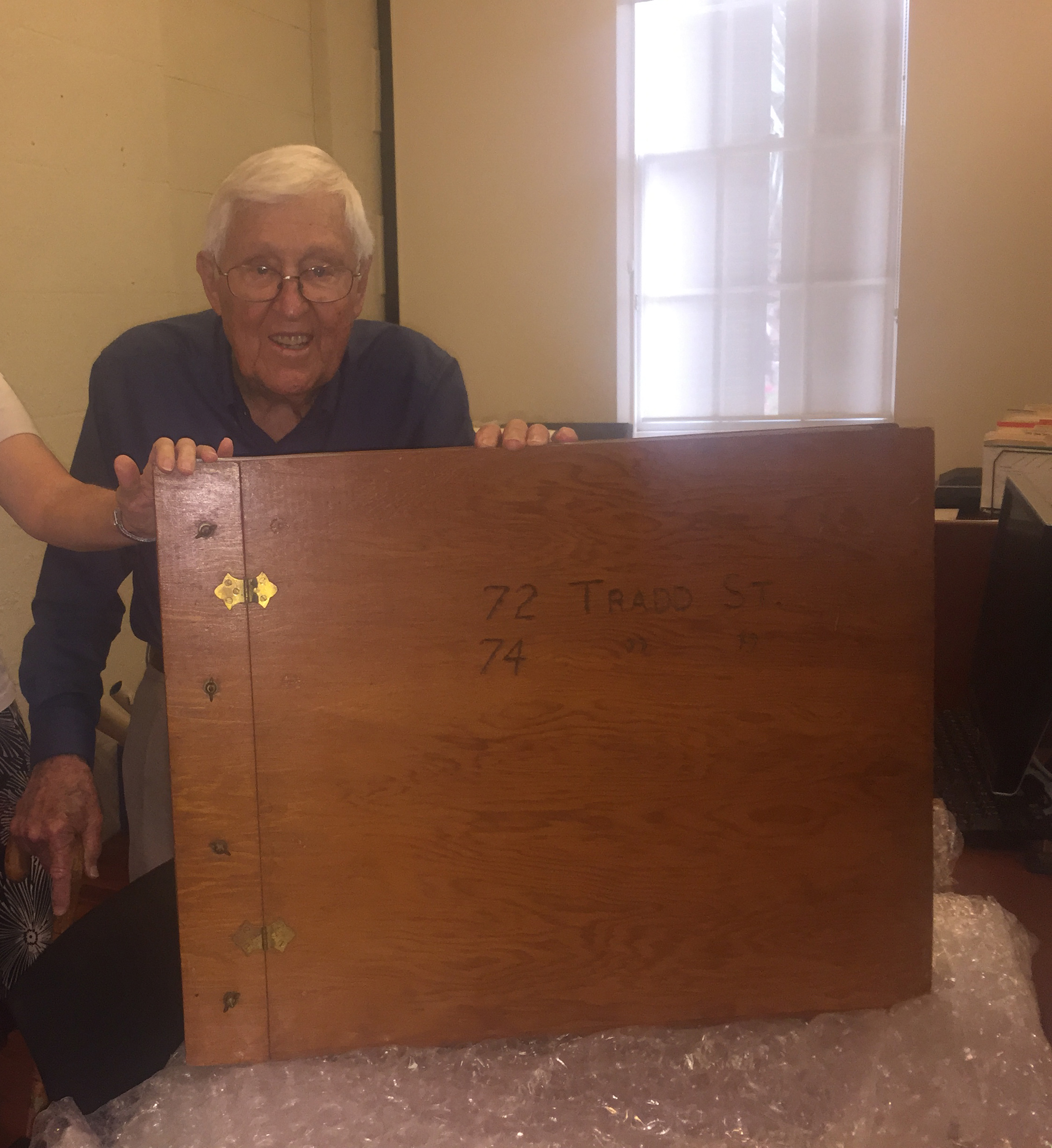By Karen Emmons, Archivist/Librarian, Historic Charleston Foundation
In July, I received a phone call from Birmingham, Alabama, regarding a donation of historic documents pertaining to the house at 72 Tradd Street in Charleston, the earliest of which dated back to 1765. The call was from the son of the owners of the house from 1980-1995 who discovered the collection of documents among the belongings of his recently deceased mother. I accepted the donation as it seemed like it would enhance the documentation already on file for the large double tenement known as the Fotheringham-McNeil Tenements. My hunch was right! About a week later, the large package arrived, and secured between two wooden covers of this giant book was an archive of several historic deeds and other property conveyance documents dating from 1765 to 1960. These documents represent the entire ownership history of 72-74 Tradd during that time period.
But questions remained: Who had assembled this amazing book and why and how did it end up in Alabama? All of the documents were contained in protective sleeves and many of the oldest ones appeared to have been mended and conserved. The wood cover was carefully crafted, with the address etched onto the front. It was obvious that whoever assembled the book did so out of love for both the house and for the documents. I and my colleague Katherine Pemberton (HCF's Manager of Research & Education) marveled over the contents as we went through the book page-by-page to try to discover a clue. It was there, on the last page … a blueprint drawn for Mr. and Mrs. Thomas E. Thornhill.
Thomas (“Tommy”) Thornhill is well-known and beloved by Historic Charleston Foundation. He is a long-time preservationist, serving on HCF’s Board of Trustees for almost 30 years (including 3 years as president), and he continues to be active. Katherine and I immediately felt that it had to have been Mr. Thornhill who had assembled the book. And so another hunch became reality when Katherine called Mr. Thornhill to tell him about the donation. As soon as she said the words “package from Birmingham,” he knew exactly what the phone call was about and was overjoyed that his beloved book had returned home at last.
As it turns out, Mr. Thornhill had acquired all of the deeds, etc., upon purchasing the house in 1958, and he had the foresight to send the oldest documents to the SC Dept. of Archives & History for conservation. Next, he and his wife stitched three sides of the protective sleeves that had been made. The documents were inserted into the sleeves, thus further protecting them from wear-and-tear. The sleeves were then bound between the two wood covers, held in place by screws, making it possible to easily remove the sleeves. Photographs that illustrate some of the changes made to the house were also added. And finally, using a wood-burning tool, Mr. Thornhill etched the title 72 Tradd onto the cover.
It turns out that the book had been gifted to the new owners when the Thornhills sold it but when the house was left vacant for some time in the 1980s, Mr. Thornhill tried to retrieve it. The owner refused but he didn’t give up and for many years, even after she moved to Birmingham, he continued trying to convince her to return the book to him to no avail. As Mr. Thornhill shared with me and Katherine, “I never stopped thinking about that book or wishing it would return to Charleston.”
Mr. Thornhill’s wish came true and so the book he created has come full circle. The "story" of 72 Tradd Street has come home in remarkable condition! Hopefully, the book will be digitized and added to HCF's many collections on the Lowcountry Digital Library. The original will remain safe in HCF’s Archives and accessible to researchers.
 Thomas Thornhill with the book containing documents regarding the Fotheringham-McNeil Tenements in Charleston, SC.
Thomas Thornhill with the book containing documents regarding the Fotheringham-McNeil Tenements in Charleston, SC.
